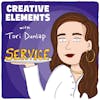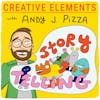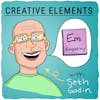
Go behind-the-scenes as we reimagine a creator’s products and services.
WATCH
▶️ Watch this episode on YouTube
***
EPISODE DESCRIPTION
Justin Moore is a sponsorship coach. His business, Creator Wizard, helps you find & negotiate your dream sponsorships so that you stop leaving money on the table.
Along with his wife April, Justin’s been a full-time creator for over 7 years and has personally made over $3M working with brands. He has also run an influencer marketing agency for over 5 years that has helped other creators earn an additional $2M.
For the last couple of years, Justin has been teaching what he knows through a live, cohort-based course called Brand Deal Wizard. But lately, he’s been working with more creators 1-on-1…
In this episode, you’ll learn:
- About Justin's suite of products known as an offer ladder
- Tiered pricing models
- The coaching side of his business
Full transcript and show notes
Follow Justin on Newsletter / YouTube /Twitter / Instagram / Follow Justin on Instagram
Justin's Website
TIMESTAMPS
00:26 - Justin Moore Has a Problem
05:24 - Designing Your Value Ladder Workshop
19:38 - Designing Your Value Ladder Workshop II
30:07 - Webinars as a Top Funnel Strategy
32:27 - Tips for Scaling Coaching Services
CONNECT
🙏 Make a guest or mailbag request
📝 Check out our curated Playlists
***
SPONSORS
💼 View all sponsors and offers
***
SAY THANKS
💜 Leave a review on Apple Podcasts
Learn more about your ad choices. Visit megaphone.fm/adchoices
Jay Clouse 00:00
I recently caught up with my friend Justin Moore. Justin is a sponsorship coach, his business Creator Wizard helps you find and negotiate your dream sponsorships. For the last couple of years, Justin has been teaching everything he knows through a live cohort based course called Brand Deal Wizard. Lately, he's been working with more creators one on one, but at the same time, he wants to scale his course too. So Justin reached out to me to talk about redesigning his product offers.
Justin Moore 00:40
So I'm very confused Jay and maybe this is therapy, I need your your counsel, I'm I'm very confused about what I would call my offer letter, an offer ladder, my value ladder, right, we're all all the different ways in which people can pay me basically, right, or all the different ways in which I'm serving my customers. The current structure is as follows. I have my on demand course, which is the very first entry point into my business, I would say it's called gifted to paid it's $500 currently, and the persona of the baton creators that would be best suited for that program, or they're aspiring, or they're kind of, you know, kind of early stage creators who are getting a bunch of free stuff. And trying to figure out how to convert those into paid partnerships, right. And so that's an on demand course, it's 90 minutes, basically, you can you can binge it. And so that was something that that was always missing from my business. I never had any anything kind of evergreen like that. And so launch that about two months ago, it's done fairly well, I would say probably made around $30,000. Total, I made $19,000 in the launch. And then since then around 11 grants, so it's something around there, right. The next rung up on the offer ladder is my one on one coaching, which is the $1,000 an hour and this is where creators, you know, are having, you know, have like I just did one yesterday a very large creator negotiating a six figure partnership. And they were they don't have a manager and they're just stuck. They're like, I don't know where to go from here. I don't know how much to charge, help me, right. So I parachuted in, I kind of got context of where they're at in the negotiation, and help them design some packages and kind of the strategy of where to move from there. And so that's the kind of the one on one approach. Then the next one up is my brand deal wizard, cohort based course, which is $3,000. Currently, or there's like an investment plan, but that is like what I would call my signature offer where I've got, you know, it's a four week program. It's extremely intense. It's live there, it's capped at 50 people. And like, that was the first thing I ever came out with. It's the most social proof I have tons of testimonials. I definitely feel like I of course market fit on that. The next, you know, the, I guess the last name, in other words, another one, then the the next rung is what I call my wizards guild, which is the ongoing asynchronous coaching. Okay, so this was a response to alumni. Essentially, people have graduated the program that said, hey, what's next? We need more support ongoing to $1,000 a month, every Tuesday and Thursday, you can ask me and other coaches on my team right now. It's just me and D, my community manager who's also a coach.
Justin Moore 03:15
Any other any questions about your ongoing deals that you're negotiating, pitching, sponsorship strategy, all that stuff, too. And so really, interestingly, is like my, I have this thesis that there is this gap between having a manager who's taking 20% of every deal, and having no one, right. And there's something in between where it's like, it's completely objective, we're not financially incentivized, whether you get the deal or not. And we're just going to get out for your best interests. It's 12 grand a year basically, if you want to do it for the whole year, and we're in your pocket. And so I currently have three people in that program. And it's been amazing dude, like I like the more I do it, the more I work with those creators, the more I feel like that should be the main offer. Like the ongoing coaching feels like it's driving the most impact the four week course is great, and some of the other on demand stuff is great, but like even people who have gone through my course like they they are constantly pinging me and like okay, this new thing came in I don't know what to do. Right? So it's like oh, this new other esoteric the thing the brand is asking for the agency I just don't know how to price this out. Right and so like the dynamics of every deal is basically different and so creators even though they have the foundation of like how to work with sponsors and all that stuff to it feels as though they still need a backstop or insurance somehow and and if you're making six figures, you know, a year doing this or more which you know, all the people in this like kind of ongoing program are it's kind of a no brainer. All this to say I'm thinking about like blowing up the offer ladder and making wrapping the CDC, the cohort based course and the intro, gifted a paid course into one complete on demand evergreen course, creating a kickass webinar, starting to run ads to it and and creating a kind of funnel, where that is kind of the intro, Brian Harris has this model, we he calls it the sum pricing model, right? The setup plus monthly. And so looking at the course that's kind of the setup, you get all the foundational knowledge, you're trained, basically. And then it's like, okay, if you want to graduate on to the coaching, here you go, right? I don't know if it's the right decision I'm getting, I've talked to so many people, and everyone is telling me different things. Like, don't do that go higher ticket, your course should be three, it should be seven, or it should be five or or no, you actually should go lower and like consolidate it and make it to K and like, you know, run the webinars and like, I just don't know what to do to man help me, Jay. You're my only hope.
Jay Clouse 05:39
I'll have his questions. I just want to dig into it more. How much do you enjoy launching the CBC every however many months? Do you like the launch game?
Justin Moore 05:49
So the launch game was very stressful for a long time, primarily because I felt like I didn't have all the pillars in place of like or SOPs and processes in place to do it in a organized fashion. It always felt as it was like going down to the wire every time. And I did not like that over the last two cohorts. though. I'm coming up on cohort eight. In two weeks here, it feels like we're kind of on autopilot. Now. I'm not stressed at all. Everything's done all the copywriting sales page, emails, everything is basically all the collateral that I teach ever, like the processes are dialed in to a point now where it's like, I could do it in my sleep basically, not not in my sleep. But you know, it's like, it's just like night and day from Cohort One basically. And it sucks. It's not sucks. But it's like, it's tricky, because there is so much magic in the live format, right? Just like being able to, like respond to people directly and office hours and guest speakers and like, you know, all that stuff. It is it is pretty magical. I agree. And so I still want to find a way to have that live element in these other things that I'm doing. But yeah, the prospect of having something that's like on demand, I can do webinars and maybe eventually transition the webinar into something evergreen, that sounds pretty appealing to me. But I just don't know, any other way. Because I haven't really done this for very long.
Jay Clouse 07:00
Yeah, I mean, I think either way, sounds viable to me, it kind of just comes down to like, what's the experience that you want to have as a creator to in it, because like when I think about CBCs, I want to die like I don't, I don't want to run it. And I also I hate the experience as a student, which I don't know if that's the minority, but like, I feel like there There comes a time where your currency is more time than it is money. And cvcs are such an inefficient way of learning, in my opinion, where like your your the value prop isn't just knowledge transfer and CVC. And most of the time, I want the knowledge transfer more than I want anything else. And I'm putting this position where I have to now take this inefficient form of knowledge transfer, because the only way it's available to me is through a CVC. To me like it appeals in any case to have the knowledge that you put into that course into a self paced version that's available somehow. I feel like makes sense. You see a lot of people moving towards that the high ticket hybrid route. Like all it all is doing it now Thiago forte is doing it now that's clear to me as a way you could go where it's like, here's the self paced version of both of these courses together. Here's self paced, plus, you know, the high ticket hybrid model, or go full wizards Guild and you get all that plus you get this asynchronous direct support from me, something like that, like, all these paths seem viable to me, it's like what how do you want your business and time to look and a little bit customer selection too. Because if you are trying to work with the creators that are doing six figure deals, like they may feel like I feel where they don't always want to drop into a group program to have access to you. And the people who do just need the knowledge might not be able to afford that program, either.
Justin Moore 08:48
It's interesting because I very much feel as though this is like a sweet spot because like once you get to a certain place in your Creator journey where you if it's a Social Media Creator, and you've got millions of subscribers, or if you're, you know, own platform creator, like newsletter operators, podcaster, and so on. And you've you're getting hundreds of 1000s of downloads per episode, like you almost always will, like have started having a team or a manager or something like that. So it's like it's the, it's the folks between, like, on one tear down basically, right, where you're still making significant revenue, it probably doesn't make sense to have a manager and so it's like, I don't know, at least the profile of the folks who have signed up to date. That's kind of been that's kind of been it.
Jay Clouse 09:29
There's another stance you could take though like when you were describing where you think the gap in the market here is my wife works for a community of financial advisors and I've started talking to somebody new advisors because I need some advisement on my financials.
Justin Moore 09:42
Because you're rich now.
Jay Clouse 09:46
Oh my god, what is that? Is that a stream deck?
Justin Moore 09:49
That is a road caster pro, my my sir.
Jay Clouse 09:53
Damn, that was good.
Justin Moore 09:55
You didn't know I was gonna be bringing that in. Did you?
Jay Clouse 09:56
I did not.
Justin Moore 09:57
I just snuck it in.
Jay Clouse 09:58
I wish you would have also just given us have like an applause, track, I can do that. Incredible. What came to mind is, you know, historically financial advising, it's like a, we take a percentage of assets under management. And they're incentivized and a lot of ways to recommend products to you that now they get a better cut off. But you see this rise of what's called like fee only advisors, where it's like, I'm gonna give you advice. Now, my incentives aren't tied to how much you're giving me, I think you could kind of take the stance that, hey, depending on how like provocative you want to be, you could go all the way to say, hey, managers are a bad thing for creators, here's how that screws you and here's why this model is better. And actually just capture that market. And think about going a step down by saying this is a new model, I'm going to capture a big part of the market that is working with managers, right now, you could choose that customer if you wanted to. Because if you describe it as a step down, you kind of make it seem like I am one step that people graduate out of towards management, which doesn't necessarily have to be true.
Justin Moore 11:05
That's actually a really great point. Because like, like, one thing I'm very explicit about about the program is that we are not your manager, we will not get on the phone with brands for you. We're not going to manage your email inbox. Like we like the creator who is participating in this is comfortable doing those things, but they want someone to like proofread, what they're what they're about to send kind of thing. So that's actually a really great point. Because yeah, there are in fact, like there are people who are participating in it, who do have significant followings and income levels and all that stuff, too, and yet have no interest in like having a manager. So you're right, there probably are people who would self select, even if they were kind of at that level.
Jay Clouse 11:43
Yeah, I could totally see that as there is some avatar of creator who is at that level, who feels like it's excessive to have a manager bringing them deals and that they may have even experienced this where the deals the manager bringing isn't even what they want. But like they see this thinly veiled like, oh, well, that's good for the manager, if I go with that, that opportunity, who just wants somebody who is on retainer, to help do these things, you know, you know, creates like new questions of capacity? And how do you build a team of people who has your knowledge that can be on your behalf. But dude, I look at what you've done the last year, and I am so envious of how good you seem to be at investing into people and building systems and like surrendering to building a larger thing. Like I have such control issues on all my stuff, where I'd hold on to everything loosely and you're like, Nope, I'm gonna find somebody's really good at this, I'm gonna pay them what they're worth, and they're gonna make it awesome. And now I have the CBC, it's on autopilot, where you have SOPs, and all the stuff is wrapped together. Like I just watched you do that for different elements of your business over time, I have no doubt you could do the same thing with like building an army of, of Justin disciples of how to, like, do this brand stuff, and I feel in a way.
Justin Moore 12:58
You know, it's it was funny. So first of all, thank you. That's very kind. I don't feel like that is the case. But it's nice from the outside looking in.
Jay Clouse 13:06
It looks like that, that looks that way. Give yourself a round of applause.
Justin Moore 13:09
I do. I do. Okay, there we go. If you say anything I don't like I'm gonna I'm gonna give you the booth. I've got a lot of different ones. Can we go back to the knowledge transfer thing real quick? Because this is something I You're right, like, it is heavily knowledge transfer for 80%, I would say of the CBC. And so I very much have thought like, Okay, this makes sense to transition, you know, something over into, and then maybe I figured out a way to have a live element on an ongoing basis for people who participate participate in that maybe there's like a monthly call or like, I don't know, asynchronous, something I don't know, there exists a solution probably.
Jay Clouse 13:48
That's the high ticket hybrid route, where it's like, here's everything pre recorded, and we do you know, this asynchronous or the the semi synchronous thing a couple times a month.
Justin Moore 13:56
And I guess my fear, is that, okay, I think part of it comes from like, lack of experience. I've never done webinars, I've never run like paid ads, like fill up registrations for webinars and all that stuff, too. Part of that is just scary. I would say number one of like, screwing up something that seems to be working, right. But then the other part of it is like it's it feels attractive to the ongoing coaching seems thing feels much more scalable. This decision would be scaled, it was like, okay, I can have the the Evergreen thing and that but the ongoing coaching, it's not just me now, it's me and other coaches. But But to your point, I don't want to go the like, I'm gonna hire a I'm gonna certify, you know, 100 coaches and like, all this stuff, and then then now I'm managing 100 people and like, yeah, choke me, right? Like, I've done that in a private previous, like, not 100 people, but I've managed an agency and lots of employees and it was great, but it was super stressful. Right? And so, I don't want that and so my, actually Jenny Blake, shout out to Jenny Blake. She has This model where she, you know, wrote pivot and free time and all this stuff, too. And she's so she trains people in her methodology. But she also does not have a team of 100. She has like five. And so she's like, there's a different, you'd have to scale it like crazy. Like, you can just keep it small. And like, that could be enough. That could be like, like, I do not want to make $100 million business. Like, I definitely do not want that. But a couple million dollar business. That sounds cool, right. And so I feel like I could do that, with this having the main offer be this kind of ongoing. And it's also about who I'm serving. I know, I'm kind of talking about the offer letter, because it's kind of a metal Creator Show, obviously. But it's like, it's very much I'm thinking about how can I have the biggest impact for my students. And I feel as though the ongoing stuff that I'm gravitating to that because it feels like the biggest impact on an ongoing basis.
Jay Clouse 15:42
Yeah. So as part of the scary thing of breaking this and changing it that you feel like the CBC is understood projectable revenue that if you change this that might go away, and that feels painful?
Justin Moore 15:56
No, because I don't feel like this is the door, I can't walk back through. Like, if it doesn't work, I feel like I could just Okay, that didn't work. I'm gonna go back to the CDC route. Yeah, and all I would lose would be time, right? Yeah. And maybe cry myself to sleep for a few nights. I don't know, I just read stats around like the, you know, completion rates of like, you know, on demand programs, it's like a abysmal, and I don't, I don't want to do it, just like, like, I want people to actually learn this stuff. It's also about impo, you know.
Jay Clouse 16:20
I think some of those stats are skewed by people who have gotten really good at coercing people to buy a thing that didn't really want to buy the thing in the first place. You know, so like, if you depending on the system you set up, if you're not being oddly pushy, and convincing people anything that they don't, I don't think that's as big of a deal. Like, I think those probably sink the average dads, and also, most, most creators who have digital products, they optimize everything up to the point of purchase, and then nothing afterwards. So it's like, I'm gonna get you to buy and then you made the decision, and you have what you need. I gave you what I promise, good luck, where I think you can do a lot afterwards, even as simple as like an email sequence that you schedule out that has four touch points over three months to be like, have you gone in there? Have you done anything? You know, like that? I think I think there's basic ways to push that I wouldn't worry about that.
Justin Moore 17:13
Part of this fear is drawn from the experience with the on demand course that I launched, which was just like, with the CDC, it's so easy to get testimonials sued. Like, I get to know these people so well. And I and at the end of it, I just literally email them or DM them Be like, Hey, would you make a testimonial for me like XYZ? And I would say I've got like, maybe 60% 50% rate of like people sending me testimonials like amazing ones. Right? And when I don't have that, like touchpoint with the on demand course, it's like I, the testimonials are few and far between basically. Right? So it's like, I extrapolate that to like people's experience actually consuming the content to, you know.
Jay Clouse 17:55
it's possible, it is possible. But, you know, I would argue that right now, you've made that information less accessible than you probably want for a lot of people in your audience, you know, so like this would make it this would be a decision towards democratizing this, giving more people even the opportunity to do this. After a quick break, Justin, and I explore a tiered pricing model for his cohort based course. And later, we talk about growing the coaching side of his business too. So stick around, we'll be right back. And now back to the show.
Justin Moore 18:30
Okay, if you were me, let's say you were in my shoes, and you've got a fully processed press. This does business with SOPs and everything. I wish I don't, by the way, but but let's just assume, would you keep the CDC and increase the investment, let's say, lots of people have told me to do this, like, hey, the ROI of your course is too crazy. Like you're getting people you're paying, people are investing three grand, and they're making over the course of their entire career, they're gonna make hundreds and hundreds of 1000s of dollars, like the ROI is just way too wildly skewed. versus what you just said is like making it more accessible, wrapping the $500 program with a $303,000 program, making it two grand, you know, like running webinars like and just kind of going the scale route, like what would you do?
Jay Clouse 19:12
If it was actually me, I would get rid of the CVC. Because again, that makes me like want to die to think about launching.
Justin Moore 19:18
Pretend you were me with the soundboard.
Jay Clouse 19:20
If I'm pretending I'm you, I don't think there's any reason. Like I think you could present to your audience, your people, a brand deal wizard, we have two payment options. You can have the self paced version for this, or you can have the CVC and have that be wildly higher priced. And I think everybody's happy. Because like it's going to select for the people it's going to select for like, there are probably a lot of people who enroll and brand deal wizard who are doing it in large part because they know they'll get direct access to you and the curriculum itself is secondary. I think that's also you know, if you are trying to go towards this asynchronous coaching being the biggest offer, I think that the CBC is probably a more We're clear stepping stone into that, because they'll have some experience with you directly and how you respond contextually to them. So like, I see that playing a part in the funnel also. But, you know, I would probably I would err, if I'm doing cvcs, I would err on still having a self paced version that's more accessible, unless like, I'm really afraid of that cannibalizing the revenue, but I don't think you're in that circumstance.
Justin Moore 20:23
So like I did that, I tried that I like between cohorts, four and five on my waitlist, sign up email, like after you signed up for the waitlist, I said, Hey, by the way, if you don't want to wait, you can pay 50% and watch the replays from the last cohort. And I had seven people, I think I was charging 2000 at that time. And so it was 1000 for that. And so I had like, I think I made seven grand or so doing that. And you're right, like, there's definitely people who want that option, like, like, for sure.
Jay Clouse 20:51
But even that, like that's watching a recording of a long thing. Whereas if you're like, you know, I'm gonna make this as easy to consume and fast and effective as possible in a produced video course, you can make it much shorter, and like people would complete it at a higher rate, probably.
Justin Moore 21:09
Okay, I might not just confusing the heck out of people who'd want to work with me have like, all these different paths, and all these things they could do, like, here's the on demand, here's the CBC, here's the on demand coaching, here's the blah, blah, blah.
Jay Clouse 21:20
I think the muddiest part is the gift of debate versus brand deal wizard. But if it's like, here's brand deal wizard, there's two ways you can get it self paced or the cohort. And if you'd rather skip all that and just have direct support for me, it's the one on one coaching, I wouldn't actively market like the one on one consulting calls that you're doing right now, that to me muddy some things, but if it's like self paced course, self paced course, plus, you know, live experience, or asynchronous coaching to me, those are pretty clearly different.
Justin Moore 21:52
Part of me is like, maybe I just like take gifted debate. And it's like a bonus basically, like, you know, for could be, you know, because there's so many of the alumni of Brando wizard have have gone back and taken that course, because even they're like, I know, I have like 500,000 followers, but I'm still getting a bunch of free product offers, you know, it feels like money in my inbox. And I'm not converting kind of thing, you know.
Jay Clouse 22:11
I think it's viable to like something that I'm going to do this year is stop actively selling a bunch of my workshops, I have like a dozen workshops that are in the lab that people can buy ala carte, I'm going to stop making those available for sale, because what I'm actually finding is they are really effective at getting people to review the podcast. And I'll say you want a free workshop, here's the list, review the podcast, take a screenshot, send it to me, and I'll send you a coupon code, it's really effective that way, which leads me to believe it also be really effective as a spark loop incentive, because it's something that you can only get through this means, you know, like this, this is scarcely of how you get this thing. So I think if you do have something that's that valuable, that you're willing to not sell anymore, I think you would be able to incentivize people to take a bunch of different types of actions that you want, or use it as a bonus for, you know, sign up in this period of time, and you also get gifted to paid, I think it's highly valuable if you aren't worried about the loss revenue from just selling it directly.
Justin Moore 23:09
I feel as though there is a very large, adjacent segment of the market of aspiring creators, people interested in influencer marketing, I've had so many people take the courses or hire me who are not creators, but adjacent to the industry, whether they're they work at brands or their managers, or they work at agencies, and they just want to understand the ecosystem better. And so I feel like there's an opportunity, and I couldn't candidly love when folks like that are in the cohort, because it provides interesting and unique perspectives to the creators that are in there. Right. So it's like, I don't fear at all like there's like people different types of people in there. I think that's a good thing. Right? And so I feel as though the opportunity to get other unique, interesting people on the email list as well as running paid ads, all that stuff. man feels like maybe I'm missing a missed opportunity.
Jay Clouse 23:56
Yeah, maybe. But I mean, I think it comes down to customer selection, you know, because you're right, like my, my wife, runs our dogs Instagram, she purchased a membership to this thing called Insta club hub. And she doesn't consider herself a creator, but like she's getting free stuff sent to our house all the time now, because of the dog's Instagram and now she's she's seeing Yes, she's seeing like the opportunity to hear I'm like, I'm just like, gently stoking the fire like yeah, is become the April to my Justin. But is that the Kherson that is eventually going to become the one to one or the asynchronous coaching client. It's a good point. Is it worthwhile trying to nurture all the way there or should you just try to capture as much market share as you can upstream?
Justin Moore 24:41
How that hits me? It's the latter, I would say because I again, it's the people I enjoy working with the most the more intermediate to advanced level creators and the whole thing about not building a ginormous business. Yeah, I'd be happy. Like if I had, you know, I'm gonna like call it right now, Jay. Okay. I I think I'm gonna have like 50 people 50, maybe 100 people in that program in like three years, oh, you can get their way sooner, Yeah, or like, but like, okay, maybe two years or whatever like that, if that was the business, and I had like a handful of sponsorship coaches, on my team helping me, I would be so happy like that, that is a life that I would be just like, boom, love it, I'm done. I don't like I just keep that life basically.
Jay Clouse 25:24
We're recording this on February 7th of 2023. If you set a goal for 50 people at the end of this year, you could easily do that. Because this is all that has to be his word of mouth. And every creator who would fall into the camp of somebody who would pay for that is in iMessage, group chats with five other people who are in the same spot who would do the same thing. And they're all probably using products like carrot financial or something, and you can go to them and work with them. Like you could do that very quickly, if that's what you wanted to do. And if you had the capacity to fulfill it.
Justin Moore 25:59
Why does that? Why did you make it sound so easy?
Jay Clouse 26:01
Well, because I don't want to do the work.
Justin Moore 26:05
And because CVSs terrify you, right? So you're
Jay Clouse 26:07
It's, well, the other thing I think about a lot though, is it's really hard to do to serve a beginner audience and an advanced audience, because advanced people just sniff out when there are beginners around like, I don't have time for this nonsense. So you kind of like preclude yourself from doing as well, with an advanced customer, the more you serve beginners, even if you feel like well, this is a whole journey, and they're firewalled off over here. It's just really hard to have the upstream advanced business, if you're working really hard to grow the larger, earlier stage part of it. This is something I've admired about Brendan's work for a long time. And I think he actually articulated this to me first, which was like, there's so many people who are competing for the beginner level customer. And then you get to a certain point of efficacy or self sufficiency, and then things drop off, because it's harder to teach people harder things. And often, there's like a lot more nuance and context. And so people just don't do it. So there's there's always naturally like a gap in the marketplace there. But we are so ego driven. This is me projecting now, we're so ego driven that we want like a large vanity numbers, and we're like, Well, we I can't get that many people to do this thing that I'm charging 10x For, you don't need that you need to attend to the people to do this thing charging 10x For but we want 100,000 followers on this platform and these big numbers that make us look huge, you know, and I don't know, I had to fight that backlog.
Justin Moore 27:43
I mean, it's the funny enough, like, that is was my exact strategy. When I started, I was like I do not my CVC I literally made a requirement that you cannot participate unless you've done at least one paid brand partnership. So like I very much was, you know, focused on that I made it aspirational on purpose. You know, it was like, I'm only going to serve this like, intermediate audience. And part of the reason why I did create this like earlier stage course around like gifted products, and all this stuff, too, is that I viewed it as like, they are my future customer. It's like they are they are someone that I'm serving at an earlier stage of my journey. It's not I'm not expending a lot of one on one type effort on that on demand program. But they could transform into someone that could I could serve very capably with some of these more advanced products or offers. Right. And so I agree, but at the same time, I guess I just kind of looked at them as being earlier on the continuum.
Jay Clouse 28:44
Yeah, I mean, theoretically 100% True. And it's not impossible to do both. I think it's really hard. It's really hard.
Justin Moore 28:52
Unless you have some soundboard, then it's totally possible.
Jay Clouse 28:59
When we come back, Justin and I explore how to grow the coaching side of his business, so don't go anywhere. We'll be right back. And now back to the show. I feel like we solved your problem.
Justin Moore 29:11
We did not solve my problem. J dammit. Oh, I don't know what I don't know what to do. J I should probably just try something and give it a shot part of me wants to try a webinar because I've never done that I feel like I Okay, here's my theme. Here's my idea I want to do a webinar around how to price I literally that is literally what week two of my courses in detail. And I literally just gonna like do make it extremely detailed and like super valuable and just like well, this is everything I know about pricing. If you want to know more take the course but like literally I'm gonna go through I feel like something like that would be dope. And then I don't know there's got to be something there like about, I don't know.
Jay Clouse 29:52
I like this idea. Something I've been thinking about a lot that could apply the situation. There's a guy I met his name is Marco. He has a channel called white board finance. And his channel trailer in one of his most successful videos is called stock market for beginners 2020 Zoo. And it's like a 90 minute full length course on this. And I feel like webinars cool, you do the webinar. And you could this isn't mutually exclusive. But why not just take that video, put it on YouTube and make calls to action in that, like, here's how you can work with me. Because I feel like long form videos on YouTube are kind of an open space still, if you do it well enough where like you do keep people's attention throughout like it needs to move. But if you make a 90 minute video that has good retention, like that thing will make you so much money in AdSense. Yes. But also if it's pointing back to you as the authority and there are other ways to pay you and buy things from you like that would just do so much like Where can I talk to this guy, he's like, Yeah, I basically redo that video, once a year, because his first version of this stock market for beginners step by step guide was 57 minutes, and it has almost 8 million views, then you can still take that same video and run a webinar on it.
Justin Moore 31:07
The beautiful and frustrating thing about being a creator doing this stuff is there's just no right answer. There's no right and wrong answers. It's like so many shades of grey, it's not binary. And I guess I just need to try it.
Jay Clouse 31:18
You can test all of it, test it all, would that webinar run people to the asynchronous coaching? Or is it running people to the combination self paced course that the latter, that's what I was thinking, is if I'm you, and you think that like asynchronous coaching is the bigger opportunity, I'm focusing most of my effort there, like how quickly can I turn that into like a $20,000, MRR product so that I have like, seemingly, very little risk to just screw around with everything else, and burn it down, Break it, build it back up if I have to. But like, start by giving yourself some cover by building the asynchronous coaching side of things, because I think you can do that really quickly. And that that revenue is going to compound really fast.
Justin Moore 31:59
Well, okay. If you, three quick ideas of how you think I could build that quickly?
Jay Clouse 32:06
Go to the people that you've already worked with in that program and say, hey, do you have any friends, if you refer a friend, I'll give them $100 off their first three months, and I'll give you $100 off your next month or something, you know, like make some incentive for both people when I'm writing this down. By the way. You can do that to the people that are in the coaching. Now, you can do that for everybody who's gone through brand deal wizard, the CBC, you know, like run some, like first month promo, have them in there, get them renewing, and once they've renewed twice and seem like they're going to continue to renew then. So here's the incentive where you can tell your friends about this, they're gonna get a better deal by going through you. And it's also going to financially incentivize you in some way. And then I think just keep doing what you're doing like you, you show up effectively as a public loudmouth as I do in different places, and just like talk about this, like, I think this could really be a spiky point of view for you to say, like, Hey, I think that there's a lot of bad actors in the world of creator managers. And I've made a better model. I think it's a very pitiable idea that could get you on different channels in different publications, if you wanted to lean that far into it. And if you don't live that far into it, then you're probably not gonna grow it as big as you could obviously.
Justin Moore 33:20
If I wanted to make some enemies amongst all the managers out there.
Jay Clouse 33:23
Yeah. Yeah. So it depends on like how provocative you want to be. You don't have to you don't have to like other them or paint them into being the enemy. You could just say like, this is a different model. And maybe it's for you, maybe it's not.
Justin Moore 33:36
Speaking of which, I literally just interviewed a manager or not interviewed, I debated a manager on my own podcast about this very topic who was immediate eau de Community Manager, because I didn't feel it would be fair to both be both a debate II as well as the moderator. Yes. But yeah, that's actually yeah, the the incentive idea is actually quite smart. And I it's not, it's something I do with the course, obviously, I already have the affiliate program set up but not for the, for the guild.
Jay Clouse 34:04
I probably wouldn't set it up as a pure affiliate in this sense. But I do think, like some sort of short term reward, meaning like, I don't think you'd want to do it as a ongoing, you know, every time somebody renews you still get that, but I do think like having an introductory offer, and then saying like, one month is free. Yeah. And this is also credited towards your next month. I think that's the way I would probably do this.
Justin Moore 34:28
If you were me, how would you compensate other other coaches that helped me out in the program?
Jay Clouse 34:37
It's a good question. I think it kind of comes down to why do they want to do it? Are they doing it for the money? Are they doing it because they see it as a springboard to their own career as a coach in this way? Because it changes you know, how you have to compensate them and also like, how much oversight into what, what does that what does your oversight look like? You know, if you're doing the certified route, then you're probably basically franchising you know, whereas in this realm, it sounds more like just contracting people that have a skill set and saying, like, Hey, you have five extra hours per week, let me buy that. Because depending on the type of person you want, you probably don't want like the typical coach, quote unquote, you probably want someone who's like a creator has been doing this for a long time, then you just know that they have kind of the same approach that you do. Because like QA is a big question you want you want someone to come in that, you know, is pretty well aligned so that you guys aren't giving conflicting advice if you're both communicating with the same person at different times. So QA is the question. And legally, the more that you give specific direction to the contractors you employ, they actually become employees by the law and not contractors, so.
Justin Moore 35:47
Yeah, I to that point, like I have drawn up some like, like, the idea would be that there'd be some sort of training, you know, like a one day type idea, like, here's the Crash Course sop on how to I actually already already have a shortlist of people who have expressed interest in servicing overflow demand that I have have generally, and these are people who are industry folks, not just creators, these are like, friends I have who've worked agencies, managers, all this stuff, too. So like there seems to be interest in like people wanting to facilitate this type of thing, you know.
Jay Clouse 36:16
That's interesting. It's really interesting as a value proposition to say, our coaches have experienced as managers. I don't know what managers do post management, but I'd imagine some of them probably get into being a creative themselves, because we're like, I want to be the guy, or girl. That's interesting, I'd probably just try to do work for hire.
Justin Moore 36:37
Okay, well, I guess we need to do a follow up episode in a year, or less than that, when I hit the hit the 50. I used to be so good about setting goals, dude, like, but I've been so treating this, like so much like a skunkworks that I just was just I've just been so tickled with any any incremental improvement. It's like, I don't even whatever, like I'm making like $1,000 more a month cool. Like you're making 10,000 more cool. It's like, I don't know, I need to scatter about that.
Jay Clouse 37:05
Well, I don't know do like sometimes it's sometimes it's nice to have that different outlet, like playing a different role in your business. Because if you just start putting goals on it, and you're putting pressure on it, you're gonna change your relation to it just to some degree. But if this is truly gonna become like, an easy thing for the business, and maybe you want to push a little harder for it.
Justin Moore 37:24
I know you asked me on here for something very different. But I'm very, very appreciative that we got to have this be a therapy session.
Jay Clouse 37:31
I wanted this to just be like hanging out and talking to Justin and this was more fun to me than what I would have talked about.
Justin Moore 37:38
Well, I hope it was valuable to everyone listening to I just I feel like so much of us have these like internal struggles with the structures of our businesses and it's very difficult to articulate sometimes like what the challenges are. So it was hugely helpful to just kind of get it out of my brain and yeah, thanks dude.
Jay Clouse 38:01
If you want to learn more about Justin or his course brand Deal Wizard, you can visit his website at creatorwizard.com or find him on Twitter @justinmooretfam. Links to all of that are in the show notes. Thanks to Justin for being on the show. Thank you to Connor Conaboy for editing the video for this episode. Thanks to Emily Clouse for making the artwork for this episode. Thanks to Nathan Todhunter for mixing the show and Brian Skeel for creating our music. If you like this episode, you can tweet @jayclouse and let me know and if you really want to say thank you, please leave a review on Apple podcasts or Spotify. Thanks for listening and I'll talk to you next week.
Most Popular Episodes
New to the show? Check out some of our most popular episodes.

























